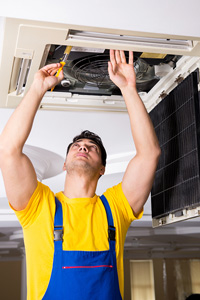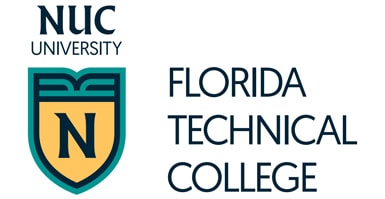Florida HVAC Training Schools

Florida HVAC training can help launch you into a satisfying career in a vital trade.
Florida is one of the best places in the country to start an HVAC career. With a hot and humid climate, this trade is always in demand. According to the Bureau of Labor Statistics, Florida employs more HVAC techs than almost any other state. Based on projections from the state's Department of Economic Opportunity, HVAC job growth is expected to continue well above the national average through 2031.
Think about it: Residential, commercial, and industrial buildings all over the Sunshine State depend on complex heating, cooling, and ventilation systems to maintain comfortable indoor environments—even when outdoor temperatures fluctuate and humidity levels change. With the job-focused training you can get from Florida HVAC schools, you have the opportunity to develop the technical know-how to install and repair those kinds of systems and keep them functioning effectively. Plus, you can benefit from a mix of in-class and hands-on learning. And you can graduate ready to pursue an active and challenging career in this reliable trade.
Florida HVAC Schools
Sponsored Listings
Tulsa Welding School
- Jacksonville
- Electro-Mechanical Technologies
- Refrigeration Technologies
Florida Technical College
- DeLand
- Kissimmee
- Lakeland
- Orlando
- Pembroke Pines
- South Miami
- Tampa
- HVAC/R
- HVAC/R with PLC
Frequently Asked Questions About the HVAC Trade in Florida
 In a state that stays relatively hot and humid all year round, it's not surprising that skilled professionals who know how to keep indoor conditions cool and comfortable are in great demand. Florida HVAC training can give you the technical knowledge and practical abilities you need to build a solid future in this dynamic trade.
In a state that stays relatively hot and humid all year round, it's not surprising that skilled professionals who know how to keep indoor conditions cool and comfortable are in great demand. Florida HVAC training can give you the technical knowledge and practical abilities you need to build a solid future in this dynamic trade.
Curious to learn more? Here are answers to four of the most common questions about the HVAC profession in the Sunshine State:
1. How Can I Get Into the HVAC Trade in Florida?
Trade schools, technical institutes, and vocational colleges across Florida offer short training programs that can prepare you for entry-level positions in the HVAC field. In fact, you can complete a certificate or diploma program in a year or less. Alternatively, an associate degree program generally only takes about two years.
HVAC programs include a combination of classroom study and hands-on training. You'll receive instruction in topics like piping, soldering, and pressure testing. You'll also learn about electrical circuitry, mechanical systems, air distribution, building codes, and safety protocols.
Many programs also give you the chance to accumulate work experience hours that can be applied toward your contractor's license (see below).
2. Do HVAC Technicians in Florida Need a License?
HVAC technicians do not need to be licensed to work in Florida. However, the federal Environmental Protection Agency (EPA) mandates that anyone who handles refrigerants must be certified. That requires passing a written exam. Many Florida HVAC schools prepare their students for the EPA exam; some even include it as part of their programs.
If you want to work as an independent HVAC contractor, you will need an air conditioning license from the Florida Department of Business and Professional Regulation. To qualify for a license, you must be at least 18 years old and have four years of combined education and experience.
There are two types of licenses, each of which requires passing a different exam. With a Class A license, you can work on equipment of any size. With a Class B license, you are limited to cooling systems of 25 tons or less and heating systems with outputs of 500,000 BTUs per hour or less.
3. What Is the Job Outlook for HVAC Techs in Florida?
There are abundant opportunities in the HVAC field. According to May 2022 Occupational Employment and Wage Statistics program data, Florida had the second-highest level of employment for HVAC mechanics and installers in the country. Nationwide, six of the top 10 metro areas with the highest concentration of HVAC jobs are in the Sunshine State. The Florida Department of Economic Opportunity estimates that employment in this profession will grow over 8 percent in the state between 2023 and 2031. That means over 31,000 new HVAC jobs should become available in Florida.
4. How Much Do HVAC Technicians Earn in Florida?
You can make a comfortable income in this trade in Florida. According to the Florida Department of Economic Opportunity, the statewide median hourly wage of HVAC mechanics and installers was $22.72 in 2022. That translates into annual earnings of $47,260 for full-time work.
Reach for Your Goals
Take aim at a better future. Florida HVAC training can enable you to get the skills and expertise you need to achieve your vocational ambitions. Start by exploring the programs listed above. Or generate a list of convenient training options close to you by putting your zip code into the school search tool.
Featured Florida Programs
Featured HVAC Schools Locations





